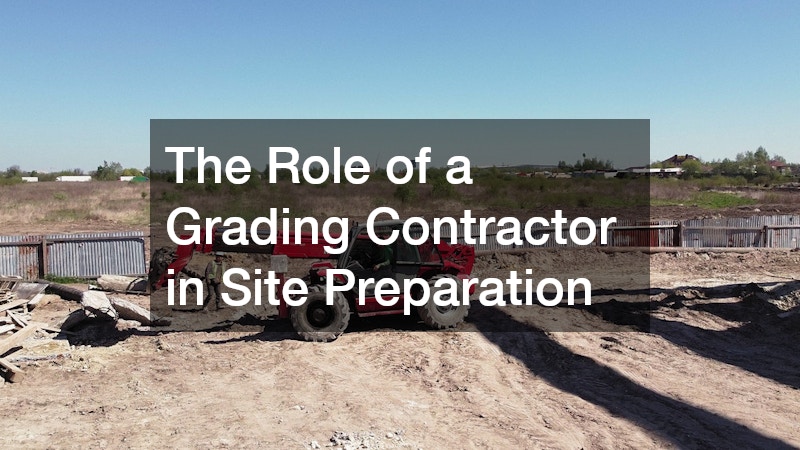When embarking on a construction project, site preparation is a foundational step that ensures the successful execution of subsequent tasks. Central to this process are grading contractors, whose specialized skills and expertise lay the groundwork for safe and stable construction. Their role is pivotal, influencing both the immediate and long-term outcomes of building endeavors.
What Does a Grading Contractor Do?
Responsibilities and Tasks
Grading contractors are entrusted with the crucial task of preparing the construction site, ensuring it is safe and suitable for the planned structure. They perform tasks such as leveling the ground to create a stable base and trenching to ensure proper foundation laying.
Through their efforts, the site is transformed from an uneven terrain into a viable and construction-ready plot.
Additionally, grading contractors are responsible for excavating areas when necessary, accommodating utility lines and other essential infrastructure. This aspect of their role requires precision and adherence to the construction plan to maintain the project’s structural integrity. Grading contractors collaborate with engineers and architects to implement designs accurately, preventing costly errors.
Coordination with other construction professionals is essential, as grading contractors must integrate their work with upcoming construction phases. Their input is vital in reviewing site plans and assessing potential grading needs. Through expert site assessments and adjustments, grading contractors help to avert complications during construction.
Tools and Equipment Used
In their line of work, grading contractors utilize a variety of tools and heavy machinery to complete tasks efficiently and effectively. Bulldozers and excavators are commonplace on a grading contractor’s site, adept at managing large volumes of earth and reshaping terrain. The use of these machines not only boosts productivity but also ensures precision in grading tasks.
Other essential equipment includes motor graders, which are instrumental in achieving the desired level of surface smoothness. Lasers and GPS systems are often employed to increase accuracy, ensuring that elevations and slopes are precisely as needed according to design specifications. This technology integration helps minimize human error and speeds up the grading process.
Furthermore, compactors are used to solidify the prepared ground, mitigating the risk of future settlement and ensuring a solid foundation for construction. These tools are indispensable for creating an immovable base that can sustain the weight and stress of a structure. Mastery of this machinery establishes the grading contractor’s vital role in site preparation, contributing to overall construction efficacy.
The Importance of Grading in Site Preparation
Impact on Structural Integrity
Proper grading is integral to the structural integrity of any building project, as it lays the groundwork for subsequent construction activities. By ensuring a level foundation, grading contractors play a direct role in preventing structural issues that could arise from uneven land. This careful preparation minimizes the risk of shifting or settling that can compromise a building’s long-term safety.
Moreover, the grading process involves strategic earthmoving to distribute loads evenly across the construction site. This attention to detail is critical in supporting the intended weight and purpose of the finalized structure. The uniformity achieved through grading establishes an enduring stability that benefits the building’s occupants and functions.
Prevention of Water Drainage Issues
Grading contractors play a key role in addressing potential water drainage problems, which can significantly impact site usability. By contouring the land effectively, they facilitate proper water runoff, reducing the risk of flooding and erosion. Planning for adequate drainage is essential to maintaining the structural integrity and safety of the site.
Inadequate grading can lead to water pooling, compromising the foundation, and increasing maintenance costs. By using precise slope calculations, grading contractors ensure water is directed away from structures, protecting against damage and deterioration over time. This proactive approach helps avoid issues that could lead to costly repairs and project delays.
Choosing the Right Grading Contractor
Qualifications and Experience to Look For
Selecting a qualified grading contractor involves evaluating their credentials and experience to ensure they meet the project’s demands. Key qualifications include industry certifications, licenses, and a track record of successful site preparation tasks. These indicators of expertise suggest a contractor’s capability to handle the complexities of grading work.
Experience in diverse site conditions and familiarity with various construction types further enhance a contractor’s proficiency. A seasoned grading contractor possesses a deep understanding of the intricacies involved in precise site preparation. Their background in similar projects can offer reassurance of their ability to manage your site effectively.
Evaluating Previous Work and References
Examining a grading contractor’s previous work offers valuable insight into their craftsmanship and reliability. Reviewing past projects helps gauge the quality and consistency of their site preparation efforts. It is prudent to request references from previous clients, who can offer firsthand accounts of the contractor’s professionalism and workmanship.
Client feedback is an invaluable resource in assessing a contractor’s ability to meet deadlines and budgets while delivering exemplary results. Follow-up conversations with referees provide a deeper understanding of the contractor’s approach to problem-solving and customer service. Prior client satisfaction can be a strong indicator of the contractor’s future performance on your project.
Grading contractors are integral to the success of construction projects, providing the expertise and precision required for effective site preparation. Their responsibilities encompass a range of tasks, crucial for preparing a site that supports structural integrity and prevents water drainage issues. With careful contractor selection based on qualifications, experience, and past performance, stakeholders can confidently commence their projects with a well-prepared site.




